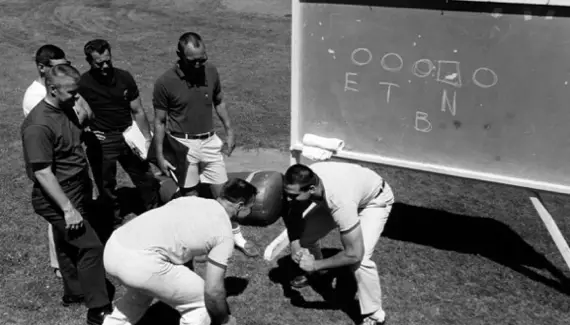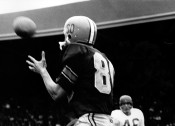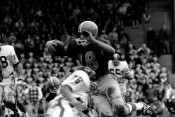©University of Oregon Libraries – Special Collections and University Archives
On the eve of this year’s Civil War game between Oregon and Oregon State many, if not most, fans don’t know that some Ducks and Beavers football players were once actually teammates on Eugene’s only professional football team — the Bombers. It didn’t last long – who would have thought? The Eugene Bombers were a minor league football team that began in 1966, and ended one season later in 1967.
With team colors of blue and gold, the Bombers started as members of the North Pacific Football League. The coaching staff both seasons of its short life included former Ducks Jack Crabtree (head coach) and Jack Morris (defensive coordinator and coach). Junction City High School was selected as the Bombers first training camp because of its location between Eugene and Corvallis. The idea was that it would facilitate the ability of players to travel to the practice site from school and/or work. Eventually, practices and games were moved to Bethel Park in Eugene after the conclusion of the Eugene Emeralds’ season.
Players were not paid a salary as such; however, they were reimbursed for their expenses, and if the team did well financially the players would receive a dividend. Many of the players also held down jobs and/or were still attending school.
The Bombers had a working agreement with the Oakland Raiders, where players who did not make Oakland’s regular season roster would be sent to Eugene. However, it does not appear that the Raiders followed through on the plan.
The Bombers’ roster was filled primarily with former Ducks and Beavers players. From UO came Paul Burleson (WR), Doug Post (QB), Roger Daniels (QB), Tim Casey (MLB), Ray Palm (WR), Ancer Haggerty (OLB), Hugh Oldham (HB), Ed Thomas (OG), Jack Clark (OLB), Dick Winn (FB), Clark McKinney (LB), Eddie Lynn (DB), John Ripper (S) and Gary Davis (DL).
OSU’s contingent included Bill Stellmacher (OG), Len Frketich (TE/P), Ken Brusven (OL/DL), Jim Sinyard (FS)/player coach), Ron Aarts (C), Mike Dolby (OT) and Tim Osmer (DB). There were also players from some of the smaller colleges in Oregon including Rod Nedry (CB, Lewis & Clark), Gene Ficek (DB, Willamette), Greg Stevens (C/DE, Southern Oregon) and Tom Roach (PK, Portland State). There were also several players who had not played college football: Bill Ford (WR/TE, Corvallis High School), Arnie Milhelm (CB, North Eugene High School), Bob Officer (FB, South Eugene High School) and John “Big Daddy” Watts (DT, Camp Adair USAF).
Eugene opened the 1966 season with three consecutive victories. Each of their home games drew record crowds for the league through October, tailing off as the weather got colder and wetter in November. The only team the Bombers could not defeat that year were the Seattle Ramblers, who finished undefeated, and featured former Ducks Larry Hill (HB) and Ray Johnson (DT). The Bombers finished with 8-and-2 record. Several Bombers were named to the All-Star team, including Ray Palm, Mike Dolby, Tom Roach, Tim Casey and Jim Sinyard.
The 1966 season had been successful on the field but not so financially. While home attendance had been good, Bethel Park simply was too small to accomodate the crowds needed to make the franchise financially viable. Despite this challenge, the owners refused to throw in the towel.
The Continental Football League, which had come into existence in 1965, was looking to expand to the West Coast in 1967. A Pacific Division was created including Eugene, Seattle and Victoria from the NPFL, along with teams from Orange County, San Jose, Sacramento and Long Beach. The Bombers’ program remained much the same in 1967 despite changing leagues. The coaching staff held fast but added Mike Dolby as a line coach. Returning players included Ducks: Burleson, Casey, Daniels and Oldham. That season, Oldham switched to defense where he was among the CFL’s leaders in interceptions, as well as kickoff returns – he returned two kickoffs for touchdowns and two interceptions for scores.
New Bombers’ players included Oregon alumni Mike Barnes (DB), Mike Brundage (QB), Ray Eaglin (C/DE), Arlan Elms (RB), Ken Klein (DB), Jim Kollman (OG), Herm McKinney (DB), Sam Owens (RB) and Tim Temple (DB). The only returning former Beaver was Len Frketich. However, there were a number of former Beavers who joined the Bombers in 1967: Paul Brothers (QB), George Carr (LB/DE), Skip Diaz (DT), Greg Hartman (LB), Dick Jones (DB), Olvin Moreland (WR), Jack “Mad Dog” O’Billovich (LB) and Dennis Rosario (LB).
While their working agreement with the Oakland Raiders had proven worthless in 1966, the Bombers were far more successful in 1967, signing a new deal with the Chicago Bears. The Bears provided Eugene with Fritz Greenlee (WR/LB, Air Force & Arizona), Wayne Becker (C/OT, Montana), Chet Ward (RB, Rutgers), Eddie Orr (WR/DB, Phoenix J.C.), Greg Duff (OT, Idaho State), Dennis Brewster (OG/DE, BYU) and Kollman.
Despite the infusion of talent from Chicago, the Bombers finished with a 6-and-6 record, good for fourth place in the Pacific Division. Jim Kollman and Len Frketich made the Pacific Division All-Star team on offense. Skip Diaz, Jack O’Billovich and Tim Casey made the All-Star team on defense.
After that season, financial realities set in. Without a larger stadium the Bombers could not attract enough fans to make the team viable. Expenses included salaries and considerable costs for travel to California. The Bombers folded before the 1968 season. The Ducks and Beavers were once again on separate teams, the natural order of things in this state of perpetual football civil war.
Related Articles:
Jim currently resides in Ellensburg, Washington where he has had the opportunity to watch former Ducks such as NaDerris Ward and Scott Grady play for Central Washington University, Jim’s alma mater. However, Jim was born in Eugene and attended Howard Elementary School, and what then called Colin Kelly Junior High School before moving to Washington. Jim began following the Ducks during the 1957 season and had the opportunity to watch a number of games at Hayward Field. Over the years, Jim has developed a wealth of knowledge about Oregon sports history. When not editing on Fanbase.com or working in his garden, Jim manages to find time to practice law.




